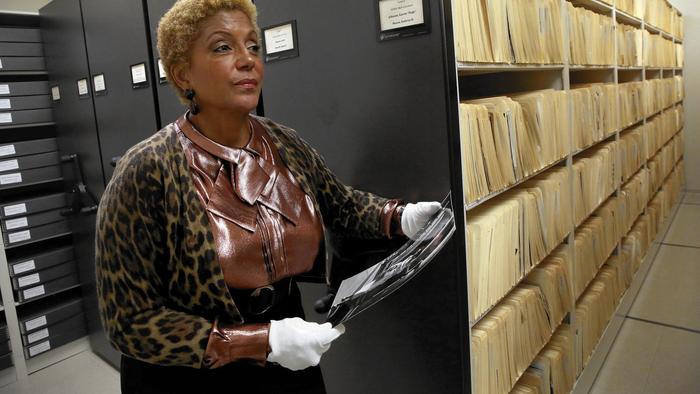A picture is worth a thousand words. You know that.
Measured in dollars, Johnson Publishing is hoping 5 million of them will fetch closer to $40 million.
Looking to raise cash, the Chicago-based publisher of Ebony magazine has put its entire photo archive up for sale. The historic collection spans 70 years of African-American history, chronicling everyone from Martin Luther King Jr. to Sammy Davis Jr.
Johnson Publishing has had its collection appraised and recently hired a consultant to shop its wealth of iconic images, including a 1969 Pulitzer Prize winning photo of King’s widow and child, taken at his funeral.
“It’s just sitting here,” said Johnson Publishing CEO Desiree Rogers. “We really need to monetize that in order to ensure growth in our core businesses.”
Ebony, a monthly lifestyle magazine targeting African-Americans, was first published in November 1945. It came of age during the Civil Rights movement, with Ebony staff photographer Moneta Sleet Jr. producing some of the most important images of that turbulent era.
Sleet followed King from the 1955 Montgomery bus boycott to the 1965 Selma march. And he was there in April 1968 for King’s funeral, capturing his widow, Coretta Scott King, with their 5-year-old daughter, Bernice, pressed forlornly against her lap. The powerful and poignant image earned Sleet a Pulitzer Prize, the first awarded to a black journalist. Sleet died in 1996 at 70.
Putting a price on his body of work will fall to the newly retained consultant.
“This is an incredibly important archive.” said Mark Lubell, executive director of New York’s International Center of Photography. “It is the definition of the African-American experience in the latter half of the 20th century, and it’s an amazing, valuable asset.”
Raising capital is crucial for the company, which is facing declining revenue and a rocky transition from print to digital under Rogers, the former social secretary for President Barack Obama, who has been steering the legacy African-American media company since 2010.
Her moves have included taking on a minority partner for the family-owned company, redesigning Ebony, its flagship magazine, and taking the money-losing weekly digest Jet out of print circulation.
Rogers inhabits a spacious 21st floor perch overlooking the lake along South Michigan Avenue.
The views from the small, unmarked archive room in the back are even more remarkable, and may be the key to keeping the privately held company on solid financial ground.
Winding through conference rooms and past cubicle stations, a short hallway leads to a white door. Behind it are 70 years of history documenting the African-American experience.
Alphabetized vaults are opened by hand cranks, revealing shelves of photos in manila folders stacked floor to ceiling. The fireproof room is kept cool to preserve the collection, with white gloves at the ready for the few allowed to examine the specimens firsthand.
Linda Johnson Rice, chairman of Johnson Publishing and daughter of founder John Johnson, recently leafed through her family’s legacy, now for sale.
In addition to King’s funeral, she offered a glimpse of other memorable Ebony photos including Jackie Kennedy consoling Coretta Scott King, Muhammad Ali and Floyd Patterson’s first fight in 1965, glamorous shots of jazz singer Billie Holiday, and some less famous subjects, such as New York limousine owner Roosevelt Zanders posing proudly in front of his fleet of 1950s-era Cadillacs.
“This is just a tiny piece of what’s in the Johnson Publishing archives,” Johnson Rice said. “It’s not just celebrities. There are many human interest stories here.”
In 2011, JPMorgan Chase’s Special Investments Group took a 40 percent stake in Johnson Publishing to infuse much-needed capital into the historic but struggling media company. Rogers said selling the photo archive is a much bigger deal for the company, which has seen declines in its ad revenue outpace that of the magazine industry at large.
Ebony has a total average circulation of 1.26 million, according to the Alliance for Audited Media, topping rival Essence, which is published by Time Inc. Advertising revenue at Ebony was down 24 percent last year, while Essence declined 7.5 percent, in line with the industry, according to Standard Media Index. Standard Media Index monitors ad spending through data obtained from media buying agencies.
Rogers, who would not disclose revenue, said the ad decline at Ebony was 8 percent last year. She added that Ebony is raising ad rates for 2015 and that 60 percent of sponsors have agreed to pay more to stay in the magazine, bucking industry trends.
Still, Johnson Publishing faced a uniquely challenging 2014.
In April, Amy DuBois Barnett, editor of Ebony since 2010, left the magazine to join ESPN, where she is helping launch a website focused on African-American sports and culture.
She was replaced at Ebony by Mitzi Miller, her counterpart at sister publication Jet. The next month, Johnson Publishing announced plans to replace the print version of Jet with a new digital app. The digest-size weekly had been a staple among African-American readers for 63 years but a source of red ink for its publisher in the digital era.
Jet had a circulation of 720,000 and an annual subscription rate of $19.99 when it published its final print edition in June. The digital app rolled out in July, with promises of fresh content on a weekly basis, video interviews, 3-D charts and archival photos.
By October, it was essentially shelved, despite an unknown number of users who “mistakenly,” as Rogers describes it, paid $19.99 for an app that was promoted as free on an introductory basis.
As of last week, Apple’s App Store still offered a 30-day free trial with any subscription deal and featured dozens of negative reviews from paid Jet Digital subscribers. Rogers said Jet notified Apple in October that they had decided to offer the app for free, but a complaint dated as recently as Jan. 5 carried the headline “Waste” and said, “I’m constantly billed … but I can’t access the magazine.”
Rogers said Apple informed the company Thursday that they had processed all of the Jet Digital refunds, but would not disclose how many subscribers had paid for the app.
“The process to get here has been a little choppy,” Rogers said.
Also looming is a $5 million defamation lawsuit against Johnson Publishing and a freelance writer filed in August by a Georgia FBI agent and his wife, claiming a series of articles that ran in Ebony magazine falsely implicated their sons in the death of a high school classmate.
That case is working its way through the U.S. District Court in Georgia.
Rogers is hoping for better things in 2015, calling it a “key year” for Johnson Publishing, banking in large part on the sale of the photo archive.
In 2012, Johnson Publishing began offering select photos for sale from its collection, and also has pursued licensing to other media on a limited basis. An outright sale of the images could be the best way to monetize the assets.
Getty Images, a 20-year-old company that licenses its library of 170 million assets to businesses and media outlets, is the leader in the space. In 2012, private equity firm Carlyle Group bought Getty Images in a $3.3 billion deal. Rogers said Johnson’s archives could be the “black Getty,” but only in the right hands.
“One of the things that we’ve learned is we need to stick with what we’re good at,” Rogers said. “We’re writers, we’re creative folks, we produce a magazine … geared toward that African-American experience. Let’s stick as close to that as we can.”
Source: Chicago Tribune















































































































































































































































![[Video] Chicago Police Officers Caught On Video Telling Two Black Men "We Kill Mother F**kers"](https://earhustle411.com/wp-content/uploads/2018/07/evil-cop-3-300x180.jpg)
![[Video] Chicago Police Officers Caught On Video Telling Two Black Men "We Kill Mother F**kers"](https://earhustle411.com/wp-content/uploads/2018/07/evil-cop-3-80x80.jpg)












![[Video] White Woman Calls The Cops On Black Real Estate Investor, Cops Threaten To Arrest Her For Harassing Him](https://earhustle411.com/wp-content/uploads/2018/05/nosy-neighbor-300x180.png)
![[Video] White Woman Calls The Cops On Black Real Estate Investor, Cops Threaten To Arrest Her For Harassing Him](https://earhustle411.com/wp-content/uploads/2018/05/nosy-neighbor-80x80.png)


![White Scientist Says The Black Community Is Being Targeted By The Medical System, They Are Deliberatly Being Poisoned [Video]](https://earhustle411.com/wp-content/uploads/2016/05/mike-adams-300x180.jpg)
![White Scientist Says The Black Community Is Being Targeted By The Medical System, They Are Deliberatly Being Poisoned [Video]](https://earhustle411.com/wp-content/uploads/2016/05/mike-adams-80x80.jpg)








![Teenage Girl Shot In Her Stomach Three Times But Took Time To Post To Facebook [ Video]](https://earhustle411.com/wp-content/uploads/2016/02/Gangster-chick-300x180.jpg)
![Teenage Girl Shot In Her Stomach Three Times But Took Time To Post To Facebook [ Video]](https://earhustle411.com/wp-content/uploads/2016/02/Gangster-chick-80x80.jpg)







